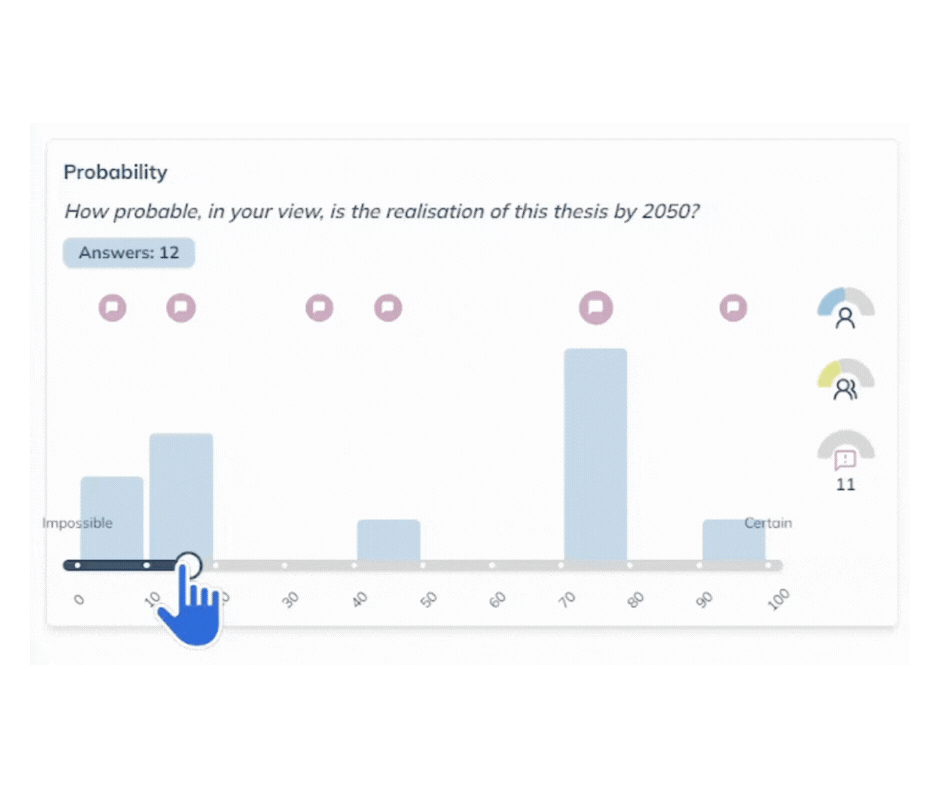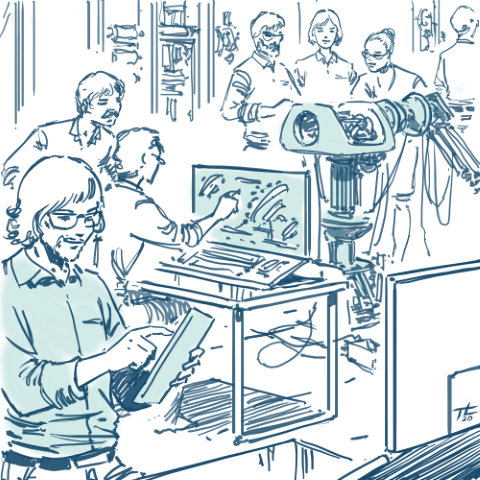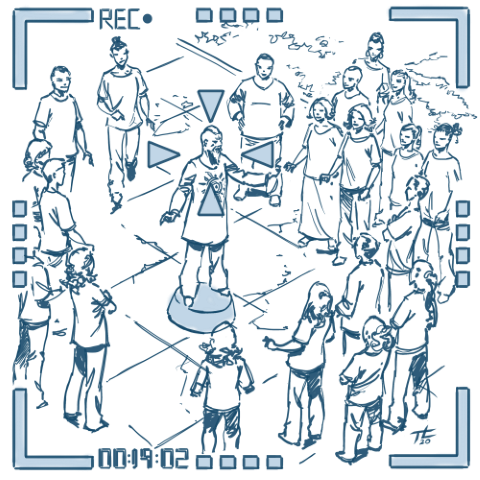Delphi Method and Real-Time Delphi
Understanding the basics of harnessing collective intelligence

Getting reliable group insights when answers aren’t easy
Imagine needing reliable answers or agreement on a complex topic where hard facts are scarce, expert opinions clash, or the future seems particularly murky. How do you move forward? Relying on a single “guru” is risky, and open meetings often get bogged down.
The Delphi method offers a structured solution specifically designed for these situations. It’s a respected process for gathering insights from knowledgeable individuals (collective intelligence) in a way that minimizes common group biases and focuses on reasoned judgment.
Let’s start with the basics of the two main forms:
The classic Delphi method (aka Multi-Round Delphi – MRD)
Think of this as a series of anonymous questionnaires sent to a panel of experts or stakeholders. After each round, participants receive summarized group’s assessments and the reasons provided for those views. Seeing this anonymous feedback allows everyone to reflect and revise their judgments before the next round.
Real-Time Delphi (RTD)
This is the modern, efficient evolution, run exclusively on dedicated online platforms. Instead of waiting for distinct rounds, participants get instant feedback on the group’s aggregated views and justifications right after submitting their own input. This allows for a continuous, dynamic interaction within a set timeframe.
This short guide will walk you through the core ideas behind Delphi, explain the differences between these approaches, trace its evolution, and show why it remains such a vital tool today.

Why Delphi? Origins in seeking reliable group judgment
Developed at the RAND Corporation back in the 1950s, Delphi emerged from the need to achieve reliable expert consensus on complex national security and technological forecasting issues where traditional methods failed and empirical evidence was lacking. The name ‘Delphi’ itself was inspired by the ancient Greek Oracle of Delphi, though the method’s creators were reportedly wary of the name’s potentially misleading connotations of mysterious forecasting, rather than highlighting the method’s true function: providing a structured way to achieve reliable group judgment by making the most of collective expertise with less-than-perfect information.
The method’s creators recognized that typical group interactions could be skewed by dominant personalities, peer pressure, or unwillingness to change one’s mind publicly. Delphi was engineered to overcome these issues through four key characteristics:
![]() Anonymity: Participants’ identities are shielded, encouraging honest and candid input based on merit, not status.
Anonymity: Participants’ identities are shielded, encouraging honest and candid input based on merit, not status.
![]() Iteration: The process allows participants to reconsider their initial judgments based on feedback.
Iteration: The process allows participants to reconsider their initial judgments based on feedback.
![]() Aggregation of group response: Judgments are aggregated statistically to represent the collective view after each round of deliberation.
Aggregation of group response: Judgments are aggregated statistically to represent the collective view after each round of deliberation.
![]() Justification: Participants receive the group’s assessment justifications from the previous stage, facilitating learning and reflection.
Justification: Participants receive the group’s assessment justifications from the previous stage, facilitating learning and reflection.
The fundamental idea is that insights or consensus achieved through this structured, anonymous, iterative process are more reliable and objective than relying on a single opinion or an unstructured group discussion.

How the methods work: Classic rounds vs. Real-Time flow
Understanding the difference in process flow is key:
![]() Classic Multi-Round Delphi (MRD): This proceeds in distinct steps or “rounds.” After participants anonymously submit their Round 1 responses (ratings + justifications), a facilitator or system compiles the results. Feedback, summarizing the scores and key arguments from Round 1, is then presented along with the Round 2 questionnaire. Participants review this feedback and submit their potentially revised Round 2 responses. This cycle repeats until the study goals are met. Note: While traditionally feedback compilation was manual, modern digital platforms running MRD can automate the feedback generation and display, but the process remains sequential with distinct phases for input and feedback between rounds.
Classic Multi-Round Delphi (MRD): This proceeds in distinct steps or “rounds.” After participants anonymously submit their Round 1 responses (ratings + justifications), a facilitator or system compiles the results. Feedback, summarizing the scores and key arguments from Round 1, is then presented along with the Round 2 questionnaire. Participants review this feedback and submit their potentially revised Round 2 responses. This cycle repeats until the study goals are met. Note: While traditionally feedback compilation was manual, modern digital platforms running MRD can automate the feedback generation and display, but the process remains sequential with distinct phases for input and feedback between rounds.
![]() Real-Time Delphi (RTD): This approach leverages technology for a continuous, integrated experience. After a participant submits their initial response to a question, they immediately gain access to anonymized, aggregated feedback showing how the group has responded so far (e.g., score distributions, medians) and can typically browse the justifications others have provided. Participants can revisit anytime during the study period, see the constantly updating group view, reflect on new arguments, and revise their own inputs whenever they feel necessary. This eliminates the delays between rounds, making RTD significantly faster and more engaging.
Real-Time Delphi (RTD): This approach leverages technology for a continuous, integrated experience. After a participant submits their initial response to a question, they immediately gain access to anonymized, aggregated feedback showing how the group has responded so far (e.g., score distributions, medians) and can typically browse the justifications others have provided. Participants can revisit anytime during the study period, see the constantly updating group view, reflect on new arguments, and revise their own inputs whenever they feel necessary. This eliminates the delays between rounds, making RTD significantly faster and more engaging.

A robust and proven method: Evolution and continuous improvement
From its Cold War origins, Delphi has become a widely respected and robust, proven methodology, applied in literally tens of thousands of studies across diverse fields – including technology foresight, business strategy, policymaking, and extensively in healthcare for developing clinical guidelines and Core Outcome Sets. Its use has significantly increased over time, demonstrating its enduring value.
The method has also undergone continuous improvement. The development of RTD was a major leap in efficiency and engagement. Today, the most significant advancements lie in next-generation RTD platforms. These platforms represent the current state-of-the-art, moving far beyond just automating basic feedback. They are meticulously designed with modern user interfaces and sophisticated features to actively facilitate deep understanding and high-quality interaction. This includes tools for intuitive exploration of qualitative reasoning, intelligent guidance systems, features for richer dialogue, and data visualization. This focus on enhancing collective intelligence through superior tools like 4CF Halnyx 2.0 is more crucial than ever in the age of AI, providing the essential structured environment for human experts and stakeholders to deliberate, interpret complex information, align on values, and make considered judgments.

A versatile framework for collective insight
The Delphi method, especially in its modern Real-Time Delphi form, offers a versatile and powerful approach to structuring dialogue and harnessing group wisdom. By leveraging anonymity, iteration, and a focus on reasoned feedback, it helps overcome common pitfalls of group work to generate deeper insights and more reliable outcomes. Understanding the difference between classic rounds and the dynamic RTD process, and recognizing the crucial role played by modern platforms designed for deep understanding, allows practitioners to choose and implement the method effectively. When thoughtfully applied with the right tools, Delphi remains an invaluable technique for navigating complexity and building informed consensus.

Experience the next generation of Delphi
4CF Halnyx 2.0 provides the intuitive, powerful, and insight-focused platform needed to conduct effective Real-Time Delphi studies that deliver meaningful results.
Interested in Delphi and RTD? Explore our expert series:
4CF Delphi Expert Series offers comprehensive insights, drawing on extensive experience, covering everything from the fundamentals to advanced applications and the crucial role of next-generation platforms. Whether you're new to Delphi or an experienced practitioner, explore these articles to deepen your knowledge and enhance your results.






Explored these? Discover even more in our full Delphi series
Interested in Delphi and RTD? Explore our expert series:
4CF Delphi Expert Series offers comprehensive insights, drawing on extensive experience, covering everything from the fundamentals to advanced applications and the crucial role of next-generation platforms. Whether you're new to Delphi or an experienced practitioner, explore these articles to deepen your knowledge and enhance your results.
Explored these? Discover even more in our full Delphi series
Stay updated! Subscribe to our newsletter:
By subscribing to our newsletter, you consent to the processing of the provided data. The data controller is 4CF Sp. z o.o., its registered office is located in Warsaw, 10/14 Trzech Krzyży Square, postal code: 00-499.
We process your data solely for the purpose of sending information about 4CF Sp. z o.o. and its activities via e-mail. Your data will be processed until your consent is revoked through a link that will be included in each newsletter. The withdrawal of consent shall not affect the lawfulness of processing based on consent before its withdrawal. Providing your data is voluntary, but necessary if you wish to receive information about 4CF Sp. z o.o. and its activities. We may transfer the data to our suppliers of services related to the processing of personal data, e.g. IT service providers. Such entities process data on the basis of a contract with our company and only in accordance with our instructions. You have the right to request access to your personal data, its rectification, deletion or limitation of processing, as well as the right to lodge a complaint with the supervisory authority. More information about your rights and about the processing of your personal data can be found in our privacy policy.






